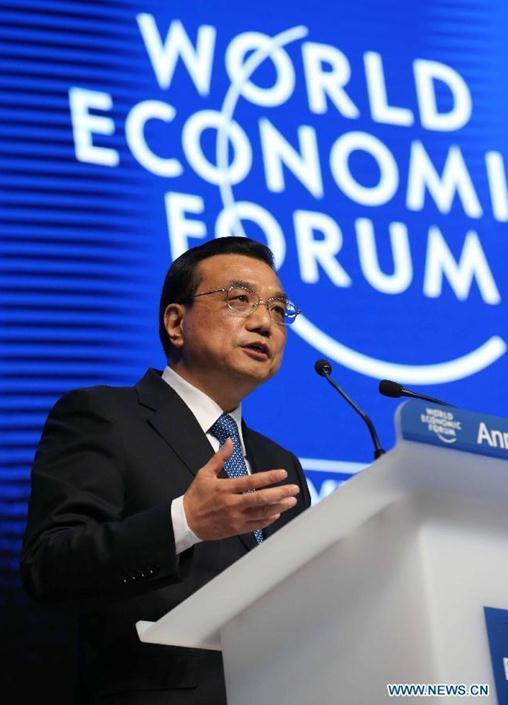Li's Switzerland trip further develops bilateral ties, co-op
 0 Comment(s)
0 Comment(s) Print
Print E-mail Xinhua, January 24, 2015
E-mail Xinhua, January 24, 2015
 |
| Chinese Premier Li Keqiang delivers a keynote speech at the World Economic Forum (WEF) annual meeting in Davos, Switzerland, on Jan. 21, 2015. [Xinhua/Liu Weibing] |
Chinese Premier Li Keqiang's presence at the annual meeting of the World Economic Forum (WEF) and visit to Switzerland further promoted bilateral ties to a new level, and injected new conceptions into the cooperation.
During the working visit to Switzerland, Li exchanged views with the President of the Swiss Confederation Simonetta Sommaruga on bilateral ties and regional issues of common concern, and outlined a roadmap for future development of bilateral relations.
They witnessed the signing of several cooperation accords in finance, food, medicine, scientific research and personnel exchanges between the two countries.
FINANCIAL COOPERATION HIGHLIGHTED
Financial cooperation is the brightest spot of Li's second visit to the Alpine country since he took office in 2013, which is famous for its banking system, precision instruments and pharmaceuticals.
Under a memorandum of understanding signed by the central banks of the two countries, China agreed to give Switzerland an 8-billion-U.S.-dollar investment quota under its Qualified Foreign Institutional Investor (QFII) program, which kicked off in 2002 to allow foreign investment in Chinese securities using foreign currencies.
The two sides also agreed to set up the first branch of a Chinese bank in the Swiss financial hub of Zurich for future renminbi clearance.
The deal is set to materialize Beijing and Bern's pledge for closer financial ties and accelerate the establishment of a Zurich offshore RMB market.
Li and Sommaruga pledged closer financial cooperation and agreed to support the establishment of the offshore RMB market in Switzerland, which analysts say marks a crucial step in the internationalization of the Chinese currency.
The Chinese and Swiss central banks already signed a bilateral currency swap agreement worth 150 billion yuan (24 billion dollars) in July last year, which was intended to provide liquidity support to economic and trade exchanges between the two countries.
China has established offshore RMB markets in Hong Kong, London, among other places, in a drive for the internationalization of its currency.
TO IMPLEMENT FTA
At the meeting with Sommaruga, the Chinese premier urged the two countries to well implement the China-Switzerland Free Trade Agreement (FTA), further optimize their trade structure and encourage and expand two-way investment.
Moreover, the two countries should deepen cooperation in areas including high-end manufacture, energy conservation and environmental protection, as well as modern agriculture.
The milestone FTA, which entered into effect on July 1, 2014, is the first free trade pact inked between China and a country in continental Europe. Switzerland has become China's first free trade partner in the world's 20 leading economies and China's fifth-largest trade partner in Europe.
According to statistics, bilateral trade rose steadily and the trade structure was further optimized in recent years. From January to November 2014, bilateral trade volume reached 38.86 billion U.S. dollars. At the same time, two-way investment has become a new growth point in Sino-Swiss economic and trade cooperation.
The FTA has exemplary effect, as it will not only enhance economic and trade cooperation between the two countries, but also encourage other countries to follow the lead and work together with China for common development.
TO ENHANCE CULTURAL, SOCIAL COOPERATION
As to cultural and social cooperation, Li and Sommaruga agreed to expand people-to-people exchanges and strengthen communication and cooperation in culture, science and technology, education, tourism and personnel training.
Li called on the two sides to conduct more law-enforcement cooperation in tracking down fugitive corrupt officials, recovering embezzled money and combating transnational crimes.
Against the backdrop of the 65th anniversary of the establishment of diplomatic ties between China and Switzerland, Li's visit will play an important role in consolidating the traditional friendship, enhancing mutual understanding and political trust, as well as rasing the levels of pragmatic cooperation between the two countries.





